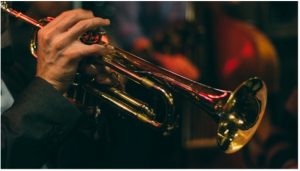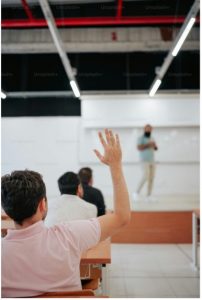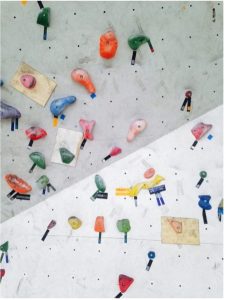
Connor Druhan currently works as a trademark examining attorney at the United States Patent and Trademark Office (USPTO). Connor is a recent graduate from Loyola University Chicago School of Law, where he focused his studies on Intellectual Property (IP) law. Before law school, he obtained a bachelor’s degree in Jazz Studies and English from DePaul University. He realized through coursework in both of his majors at DePaul his love for research, theory, and policy.
and immediately knew he had to learn more. He followed this new interest by enrolling in the IP Legal Writing Course during his first semester of law school. Throughout law school, he took as many IP-related courses as possible, joined extracurriculars to learn even more about IP, and gained work experience in trademark law by working at a small law firm that does trademark work.
He graduated from Loyola University Chicago School of Law in May 2024 and has been working at the USPTO since passing the bar examination. Connor now examines trademark applications, dedicating his time to researching and understanding how trademark law functions. In this role, he gets to do what he loves most: conduct research and understand the rationale behind laws.
Connor Druhan is a prime example of following your passions and how to stay true to yourself in law school and your career. In our conversation, it was clear he was genuinely excited about the work he was doing. He was eager to share his story and provide advice to current and future Loyola law students. It was truly a pleasure to speak with him – here are some of the key insights from our conversation.
The following is an edited version of some highlights from our conversation. The information in brackets has been added to provide additional information or necessary context. For clarity, portions of Connor’s interview are paraphrased.
Why did you attend law school? How did you choose Loyola?

At DePaul University, I studied Jazz Studies and English, both disciplines that required a strong understanding of theory. I have always enjoyed getting to learn how things work and why they work. This included an interest in policy and why laws were made. The need to understand why certain laws exist drove me to law school.
I have roots in the Chicagoland area and knew that I wanted to be in Chicago for law school, which initially drove me to Loyola Law. I thought I wanted to be a music lawyer. I did not know exactly what that entailed, but I love music and have always played the trumpet! I was fortunate to meet Professor Ho, who suggested I look into intellectual property law. I realized that “music lawyer” was the wrong term for what I was looking for. I wanted a career that allowed me to focus on theory. It was as equally cool to see the reasoning behind how to get legal protection of creative ideas, as it was to create [Connor plays the trumpet and has a deep love for both listening to and creating jazz music].
I knew that there was a strong IP community at Loyola and lots of resources available. So, I pivoted to pursuing every IP opportunity possible once I got to law school.
So, once you were exposed to intellectual property law, how did you confirm that you wanted to pursue a career in IP?
I think I must’ve taken every “soft IP” class offered at Loyola [“soft IP” typically means trademark, copyright, and trade secret law (which do not require a STEM background to practice)]. My first IP class was the IP legal writing class [which covered the same skills that every 1L learns in legal writing, but with all the assignments focused on IP]. The following semester, Professor Ho’s Global Access to Medicine: A Patent Perspective course reaffirmed that I was interested in a career focused on intellectual property law.
The summer following my 1L year, I started clerking at a small firm that practices IP law. While working at the firm, I started doing some trademark prosecution and trademark enforcement work [Trademark prosecution is the process of applying for a registered trademark. Trademark enforcement involves protecting and defending a trademark owner’s rights]. I loved it. My favorite part of the job was getting to think through and research some really weird and specific trademark hypotheticals.

During the fall of my 2L year, I took the IP survey class [covering all major areas of IP such as trademark, copyright, patent, and trade secret law]. This drilled home that intellectual property law interested me. This was also my formal introduction to copyright law. [He emphasized that he was originally interested in copyright law due to his interest in music before law school. But he did not know much about it before taking the IP survey course]. Simultaneously, I was writing my Law Journal article covering a copyright issue. [Read Connor’s published Law Journal article, which covers the theory behind copyright protection here: Blank Space: The Legal Gray Area Created by Police Abuse of Copyright Law].
The remainder of law school confirmed my interest in the theory behind intellectual property laws. I took the IP Colloquium course(with Professor Ho), Trademark Seminar (with Professor Norton), and Copyright (with Professor Walker). In these small classes, and as Professor Ho’s research assistant in my 3L year, I got the opportunity to ask questions. I got to get into the nitty-gritty details of IP laws that you might not be able to ask about in a bigger, doctrinal course.
When did you recognize you were more interested in the policy sphere of legal work and non-traditional legal roles beyond a law firm setting? What were some of your experiences working at a law firm that made you recognize what types of legal assignments you enjoy?
I enjoyed working at a small law firm that practices IP law during law school. I got to really explore trademark law and got to help clients with IP-related issues. My favorite days as a law clerk were days when a partner or associate would ask me to research something extremely specific. They’d tell me to go look into something and write a brief and tell them what I found. I was always so excited when I figured it out, like solving a puzzle. I would run into their office and really want to get into the details of the applicable laws and why something works the way it does. While I obviously was glad to help the client, what excited me was figuring out this specific legal problem and understanding how it worked each time.
Getting to look into and understand these niche trademark issues inspired me. I knew I wanted to work somewhere that I could do this every day.
Tell me about your role as a trademark examiner at the USPTO. What are some of your assignments/tasks?
Now at the USPTO, I get to review trademark applications and ensure they comply with the Lanham Act [this is the law that governs trademark registrations]. The job is more than just checking for typos. Each day, I get into the specific theory behind why trademark protection exists. For example, I can’t approve a trademark application for the word “coffee” for a coffee product. [This is because “coffee” is the product itself. By giving one company the exclusive right to use the word coffee, it would stop others from being able to describe their own coffee products]. Similarly, I can’t approve a trademark for the word “crunchy” for a bag of chips. Other chip companies need to use the word “crunchy” to describe their chips, so it would be unfair to register a trademark for that word to one company. Getting to determine what applications are acceptable lets me take a deep dive into why trademark registration exists. Each application is different and lets me research specific information to see if I can approve it.
I get to look at each application and check if it complies with the Lanham Act. If it does, I publish them. If it does not, I write a refusal. This refusal is sort of like litigation, but much more informal. I explain to the applicant why their trademark can’t be registered and what they can do to fix it. [To see an example of a trademark refusal, see my recent IP Bytes blog post! Likelihood of Confusion on Ice: The Utah Hockey Club’s Trademark Face-Off].
The job is really research-oriented. It lets me take a deep dive into a field of law I’m interested in. I get to go down random rabbit holes and learn about niche elements of trademark law every day. Somedays, I can go through a dozen applications. Others, only a few, depending on complexity. Every day looks a bit different while I’m still training. Compared to some other legal jobs, it’s a bit monotonous and sometimes might be less engaging than working for a specific client at a firm. But I get to do what I love every day: putting my head down, headphones in [to listen to his favorite jazz tune], and conducting research to better understand trademark law.
What advice do you have for current law students interested in pursuing an IP-related legal career? Any advice for someone interested in a non-conventional legal role or a government role?
If I could go back 4 years and give myself advice, I would tell myself to trust my own course and journey. In law school, a lot of people will be interested in a very similar, specific path. It is okay to not be interested in the exact same thing! We all have our own journeys, and a law degree can open a lot of doors. It’s very hard to internalize this in law school when surrounded by competitive people and high-stress environments, but remember you are on your own path! Do not compare yourself to everyone around you.
I also would say to not be afraid to pursue something that excites you and listen to yourself. You can tell in law school when something interests you. I enjoyed my time in law school much more when I stopped trying to be like everyone else and started to just take classes I thought I’d enjoy. Follow your interests and see where they lead! The end result may be much better than you expect.
Also, don’t be afraid to have hobbies!

Speaking of hobbies, outside of work, what are some things you do for fun?
Throughout law school, I worked at a rock-climbing gym. I think it’s important to have interests outside of law school, and I enjoyed both working at the gym and rock climbing while I was in school. I also still play the trumpet and love all things music, especially jazz. It’s impossible to say who my favorite artist is, it changes all the time! But my biggest jazz inspiration is Blue Mitchell and his Blue’s Moods album.

Associate Blogger
Loyola University Chicago School of Law, J.D. 2026
